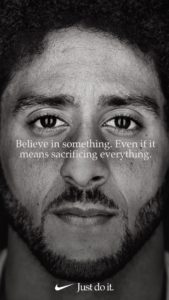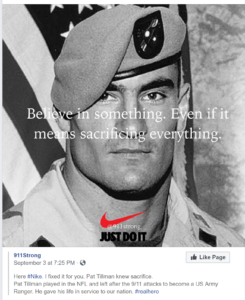 The latest expression of white populist outrage has been directed at Nike, after the corporation launched a campaign that features NFL quarterback Colin Kaepernick’s face, along with the words, “Believe in something. Even if it means sacrificing everything.” Of course, the Nike motto, “Just do it” and the iconic swoosh logo appear at the bottom of the image. Corporations generally make decisions based on what they think is good for business, and not usually for purely altruistic reasons, and by not usually I mean practically never. So, Nike executives must think that this is a good move for their brand, at least in the long run. In the short term, their stock dropped three percent, but that could be temporary and due to other factors. Meanwhile, the President’s divisive and racially-charged rhetoric has inflamed the issue. In a move that will surprise exactly zero persons, he has condemned Nike’s move in an interview with the far-right, white-supremacist-tainted Daily Caller, while reluctantly conceding that they have a right to make their own business decisions. Tucker Carlson cast aside all restraint and reached for the most extreme rhetoric available in Fox News’s pantry. He claimed that Nike’s ad was “an attack on America.”
The latest expression of white populist outrage has been directed at Nike, after the corporation launched a campaign that features NFL quarterback Colin Kaepernick’s face, along with the words, “Believe in something. Even if it means sacrificing everything.” Of course, the Nike motto, “Just do it” and the iconic swoosh logo appear at the bottom of the image. Corporations generally make decisions based on what they think is good for business, and not usually for purely altruistic reasons, and by not usually I mean practically never. So, Nike executives must think that this is a good move for their brand, at least in the long run. In the short term, their stock dropped three percent, but that could be temporary and due to other factors. Meanwhile, the President’s divisive and racially-charged rhetoric has inflamed the issue. In a move that will surprise exactly zero persons, he has condemned Nike’s move in an interview with the far-right, white-supremacist-tainted Daily Caller, while reluctantly conceding that they have a right to make their own business decisions. Tucker Carlson cast aside all restraint and reached for the most extreme rhetoric available in Fox News’s pantry. He claimed that Nike’s ad was “an attack on America.”
Now, as far as I know, Colin K. has not hijacked any airliners for the purpose of flying them into skyscrapers or launched an aerial bombing raid on battleships anchored at Pearl Habor. Those things are attacks on America. But maybe Tucker means an attack on American principles. In that case, I would suggest that trying to silence persons, dismissing the voice of a minority, and white people telling minorities how they are allowed to express themselves—those things are an attack on American principles. But they are not coming from Kaepernick; they are coming from his detractors, from the President himself down to all of his outraged (and overwhelmingly white) supporters, who have taken the tack of cutting the iconic Nike swooshes out of socks they have already paid for, burning their athletic shoes, and calling for a boycott of Nike.
Apparently John Rich, a country music star from a while back and a former contestant on Donald Trump’s The Apprentice, is still angry about an incident in which Kaepernick wore socks depicting police officers as pigs. I agree that this was a significant misstep on the quarterback’s part, because it painted with an overly-broad brush, and sent only served to give ammunition to a segment of the country that wants to frame the issue as in terms of bad people and criminals hating all police in general. But John Rich should know that it’s not about the pig socks; it’s about regular, systematic police discrimination against African Americans.
Now, when I first noticed the Nike ad, I was struck by a sense that it was risky, even if a business calculation ultimately lay behind it. I am not a huge football fan, and I would not have written about this, except that I noticed white Christians posting anti-Nike memes in my social media feeds, expressing their outrage at this black man for daring to kneel during the national anthem, and at Nike for taking up his cause.
The most notable anti-Nike meme features NFL player Pat Tillman, who volunteered for military service in Afghanistan after the 9/11 terrorist attacks, and who died in a friendly fire incident. He is called a #RealHero. Ironically, the military initially lied about and covered up the incident; they spun a false narrative about Tillman to use him as a propaganda tool, prompting several investigations, justified outrage from the Tillman family, and an apology from the Pentagon. It turns out Tillman came to openly oppose the war and was preparing to give an interview to noted scholar Noam Chomsky before he was killed by members of his unit, who then tried to cover up the real cause of his death. Whether it was an accident or murder is still an open question. But back to the meme and its message.

The meme exalts military service, and particularly dying in military service, as the ultimate form of sacrifice, and perhaps the only one that counts as heroic. At the same time, it mocks and denigrates any sacrifice that Colin Kaepernick may have made in carrying out his kneeling protest during the national anthem. But another message that it more subtly communicates is that a real American hero is white and wears a military uniform. A #realhero looks like Pat Tillman, not that black guy. So it is both militaristic in a quasi-religious sense, and thus, for Christians, a form of idolatry, and it is not so subtly promoting a white “hero” over a black one.
What message are white Christians sending when they post this meme? Many, but I will just note a few.
First, it telegraphs that white Christians either do not understand why some NFL players are kneeling or that do not believe the kneeling players when they explain why they are kneeling. According to their own statements, these athletes are not protesting the national anthem. They are not protesting the military. They are not protesting the flag. They are protesting the killing of unarmed black men by police in cities across the United States. Kaepernick explained that he was kneeling because, in important ways, the country was not living up to what the flag represents: Freedom for all. Justice for all.
Second, it sends a clear message that white, American Christians refuse to listen to, or believe, the lament of fellow citizens, and even fellow Christians. Those who post this meme seem to think that black football players are protesting something that is not really a problem. “All lives matter,” they say. “Blue lives matter.” Those statements about what lives matter are true, of course, but also completely irrelevant. They are slogans intended to make us ignore the unequal treatment of inner-city minorities. There are outrageous extremists in the Black Lives Matter movement, so we can totally ignore the laments emerging from the cities, and paint every protestor with the same extremist colors. The message this meme sends is: Black people, just shut up and don’t force me to think about the conditions of the inner city, or the terrible suffering and discrimination and struggles that millions in this country endure. I don’t want to hear about it, and I don’t want to be reminded of it. I really don’t care.
Third, it sends the message that patriotism is about flag-waving and adulation bordering on idolatrous worship for the military and the flag. But forced patriotism is no patriotism at all, and if the flag means anything, it means equal justice for all. It means the right to protest, “in order to form a more perfect union,” as someone wrote in some forgotten document. All the talk about disrespecting veterans is nonsense. Veterans served to protect the country, but also the ideals of the country, which we are far from perfectly embodying, especially when it comes to the Constitution’s stated purpose to establish justice and ensure domestic tranquility. Many veterans get this.
So, when we post the Tillman / Nike meme, we’re saying, “We don’t care that you get called a nigger. Don’t kneel at the sacred, holy event of a football game. Don’t defile our secular liturgy. Behave like we white people want you to behave. Stop making us uncomfortable. Stop making us face ugly claims about who we are as a nation, as individuals.” The fact that American evangelicals habitually combine their exaltation of American nationalism with their faith is also a serious problem, but political idolatry is a subject for another post or twelve.
Fourth, it sends the message that we really think black men should know their place. Very wealthy people own the NFL teams (they also happen to be overwhelmingly white, and none are black). But much of the angry rhetoric conveys the idea that the black players should be grateful for the (overwhelmingly white) owners’ generosity. They pay your very high salaries. You should be grateful for how lucky you are to be given this opportunity by others. This is utterly ignorant and profoundly racist, of course, since no NFL player was handed their position. Every player earned it, in a highly competitive arena, often overcoming tremendous obstacles along the way. But we still view black people as second-class citizens and their laments as an irritating inconvenience, or even an attack on our sense of self-righteousness.
Even the NFL issued a statement of support for Kaepernick’s cause, albeit one that some consider weak and tepid. NFL Executive Vice President Jocelyn Moore issued the statement:
“The National Football League believes in dialogue, understanding and unity. We embrace the role and responsibility of everyone involved with this game to promote meaningful, positive change in our communities. The social justice issues that Colin and other professional athletes have raised deserve our attention and action.”
But do white Christians really care about black communities? Do we have any understanding of the discrimination and inequitable treatment that black persons face in this country every single day? When we post the Tillman meme, we are saying: We don’t understand. We don’t want to understand. We will not make an effort to understand. And we don’t care.
The fact that white Christians are posting this meme is a symptom of the failure of American Evangelicalism to put the gospel of Jesus Christ into practical action. It even fails to accurately represent its quasi-religious faith in Americanism, given that it fails to represent the principles of the Preamble. American evangelicalism has, in large measure and particularly among its white majority, created a gospel of middle class, politically conservative, flag-waving comfort. We don’t like it when someone barges in and ruins the picture we have painted of our nation and ourselves. We hate it when someone suggests that racism is a problem, or that we are part of the problem.
But take a clue from Christ himself. He actively sought out the poor, the despised, persons in the minority, like Samaritans. He took the time to listen to these people, to hear their stories, to treat them as image-bearers of God. Before you post that angry meme, do a little research. Talk to, or at least read an article by, an actual black person—and I don’t mean those few obsequious outliers who seem to embrace our current outburst of angry racism in exchange for Twitter followers. You don’t have any black friends or aquaintances? Well, then don’t you dare post memes about NFL players. And what does that fact tell you about yourself? Take some time to listen to a story very different from your own. Just do it.™

 The latest expression of white populist outrage has been directed at Nike, after the corporation
The latest expression of white populist outrage has been directed at Nike, after the corporation 